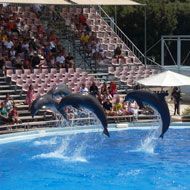Drop in public support for dolphin and whale shows

Dolphins at Fasanolandia, Italy, 2013.
A recent poll has revealed that public support for marine circuses has dropped. Fewer British tourists include watching dolphins and whales performing in tanks on their travel "to-do" lists.
It is thought that this change of public opinion could be the result of growing awareness of the ethics and physical implications of containing dolphins and whales in captivity.
The poll was carried out by Censuswide on behalf of responsibletravel.com and the Born Free Foundation. It showed that 85 per cent of 4050 British participants would choose not to visit a marine park to see whales and dolphins whilst on holiday overseas.
President of the Born Free Foundation, Will Travers OBE, said: “Are the days of the dolphinarium over? It seems clear that when presented with the information to make an informed decision, British travellers have had enough.
"It is time to bring the curtain down on the exploitation of whales and dolphins in captivity – just like the exploitation of wild animals in travelling circuses.
"There are no longer any captive dolphins in the UK and I hope that the result of this survey will hasten the day when there are no captive dolphins kept for public entertainment anywhere in the world. We have a responsibility to make that dream a reality.”
Participants in the survey were asked the same question twice, once before and once after reading a statement setting out facts about wild and captive whales and dolphins. Initially, 39 per cent said that they would not visit an overseas marine park to see whales and dolphins. However, 64 per cent of these respondents changed their minds after reading the factual statement.
Justin Francis, managing director at responsibletravel.com said: “The time has come for travel companies and the Association of British Travel Agents, to face the facts and stop supporting this irresponsible form of tourism.”
Image courtesy of Born Free Foundation



 The Veterinary Medicines Directorate (VMD) is inviting applications from veterinary students to attend a one-week extramural studies (EMS) placement in July 2026.
The Veterinary Medicines Directorate (VMD) is inviting applications from veterinary students to attend a one-week extramural studies (EMS) placement in July 2026.